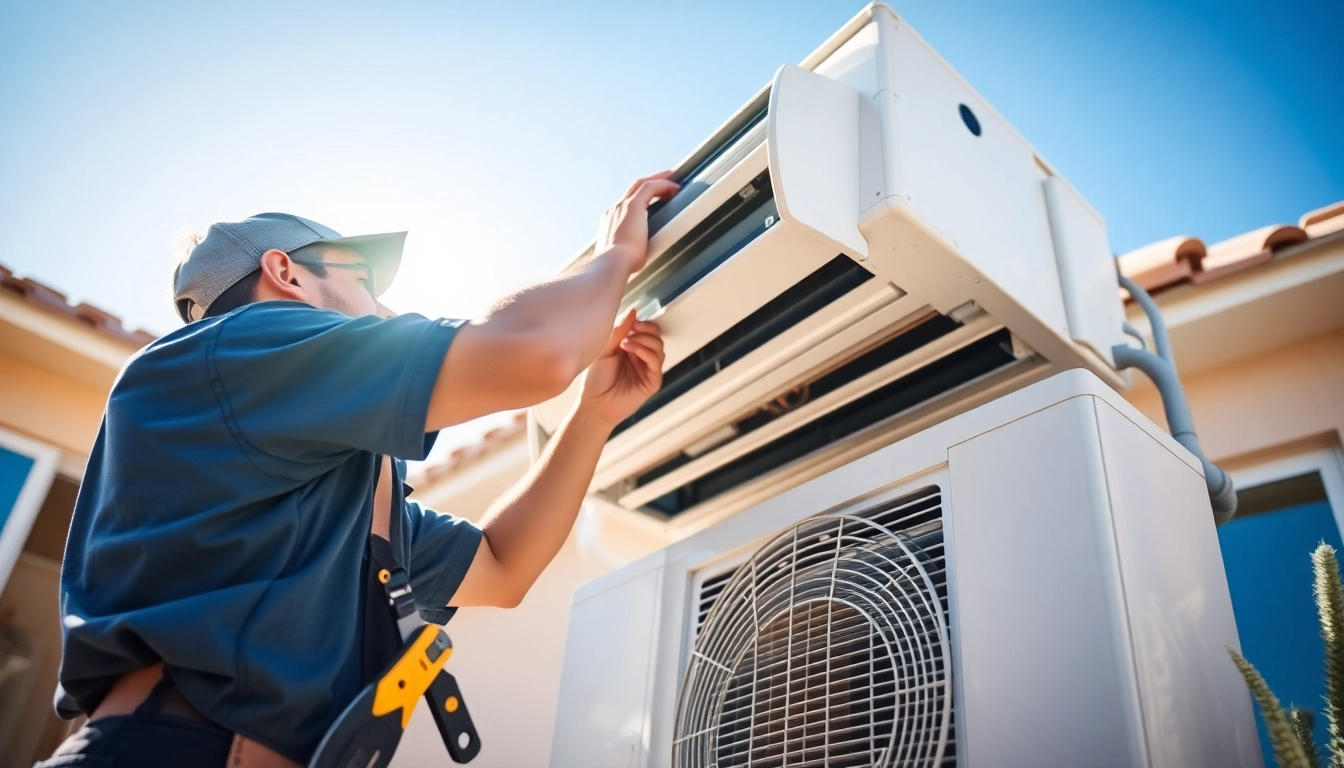Understanding AC Repair in Phoenix, AZ
What is AC Repair?
AC repair refers to a range of services aimed at diagnosing, fixing, and maintaining air conditioning systems. These services can involve simple tasks such as changing filters, refrigerant checks, and cleaning or adjusting mechanical components. More complex repairs may include replacing faulty parts, addressing electrical issues, or even overhauling entire systems. In areas like Phoenix, where temperatures soar, having an efficiently functioning air conditioning system is not just a matter of comfort; it’s a necessity for health and well-being. Professional ac repair phoenix az ensures that homeowners can enjoy cool and comfortable indoor environments during the sweltering summer months.
Common AC Problems in Phoenix
Understanding common AC problems can empower homeowners to identify issues early and seek appropriate solutions. In Phoenix, the frequent high temperatures can exacerbate particular issues, including:
- Insufficient Cooling: When the AC unit fails to cool the air effectively, it can be due to low refrigerant levels, dirty coils, or a malfunctioning compressor.
- Strange Noises: Unusual sounds, such as grinding or hissing, may indicate mechanical failures or the presence of foreign objects within the unit.
- Short Cycling: This occurs when the AC frequently turns on and off without completing a full cooling cycle, which can lead to increased wear and energy consumption.
- Leaking Refrigerant: A refrigerant leak not only hampers performance but can also harm the environment. Detecting and repairing these leaks is crucial.
If you notice these issues, it’s essential to have a qualified technician assess and repair the system promptly to avoid further complications.
When to Seek Professional Help
Knowing when to call in a professional is key to maintaining your AC system. Signs it’s time to seek expert assistance include:
- Inability to maintain desired temperatures within the home.
- Frequent breakdowns or performance issues that reoccur.
- Increased energy bills without a clear reason.
- Noticeable smells coming from the unit or home, which can indicate electrical issues or mold growth.
Attempting to repair complex issues without proper training can lead to more significant problems. Therefore, it’s advisable to rely on experienced professionals in AC repair.
Choosing the Right AC Repair Service
Key Factors to Consider
Selecting the right AC repair service involves evaluating various factors to ensure you receive quality care:
- Licensing and Certification: Ensure the company holds appropriate licenses and certifications required by local regulations, affirming their expertise.
- Experience: Look for service providers with a track record of successfully servicing AC units in Phoenix specifically, as they will better understand local climate challenges.
- Services Offered: Opt for companies that provide a comprehensive array of services, including maintenance, repair, and installation to cover all needs.
Comparing Local Services
When comparing local AC repair services, consider the following strategies:
- Request Quotes: Obtain estimates from multiple providers to compare pricing and service offerings. Look for clear breakdowns of costs.
- Check Availability: Confirm whether the company can provide timely service, especially during peak seasons.
- Response Time: Evaluate how quickly they can respond to service requests. Fast response times are critical when dealing with air conditioning emergencies.
Reading Customer Reviews
Customer reviews are invaluable when selecting an AC repair service. They provide insights into past customer experiences and satisfaction levels:
- Look for Consistency: Assess whether customers frequently mention quality service, reliable repairs, and friendly technicians.
- Identify Repeat Issues: Watch for patterns in negative feedback, as this may indicate persistent problems with a particular company.
- Utilize Multiple Platforms: Don’t rely solely on a single review platform; check Google, Yelp, and social media to get a rounded view of customer opinions.
DIY Troubleshooting Tips for AC Systems
Basic Maintenance Practices
Regular maintenance can significantly reduce the likelihood of serious issues with your AC system. Here are some basic practices homeowners can perform:
- Change Filters Regularly: Dirty or blocked filters restrict airflow and reduce efficiency. Clean or replace filters monthly during the cooling season.
- Clear the Area Around the Unit: Ensure that the outdoor compressor is free from leaves, debris, and plants that can obstruct airflow.
- Check Thermostat Settings: Verify that the thermostat is functioning correctly and set to the desired temperature.
Identifying Minor Issues
Take note of any minor problems with your AC unit that you can troubleshoot before calling in a professional:
- Inspect Circuit Breakers: If the AC won’t turn on, check if the circuit breaker has tripped and reset it if necessary.
- Look for Unexpected Sounds: Listen for unusual noises during operation, as these may indicate loose components or motor issues.
- Monitor Air Flow: Ensure that the airflow from vents is strong and consistent. Weak airflow can signal blockages or fan issues.
When to Avoid DIY
While many minor issues can be handled without professional help, there are circumstances where attempting a DIY fix can be risky:
- Complex Electrical Issues: If you suspect electrical problems, it’s best to call an electrician or technician, as mishandling can lead to hazards.
- Refrigerant Leaks: Handling refrigerant requires specialized training and equipment; always seek professional help for any refrigerant issues.
- Major Repairs: For significant system failures or if you are unsure how to proceed, it’s safer to consult a professional.
Cost Factors for AC Repair in Phoenix, AZ
Repair vs. Replacement Costs
When faced with AC issues, homeowners often must decide between repairing their unit or opting for replacement. Several factors influence this decision:
- Age of the Unit: If the system is over ten years old and requires expensive repairs, it may be more cost-effective to replace it.
- Frequency of Repairs: If your AC has required multiple repairs in a short time, consider replacement as a long-term solution.
- Energy Efficiency: Newer models offer significant efficiency improvements, potentially leading to lower utility bills even if the upfront cost is higher.
Average Repair Expenses
The cost of AC repairs can vary widely based on the issue. Some common expenses include:
- Lubricating or cleaning parts: $75 – $150
- Replacing a capacitor: $100 – $250
- Cooling coil repairs: $200 – $800
- Refrigerant recharge: $70 – $150
Always request an estimate before agreeing to any services, and ensure that you understand what is being charged and why.
Financing Options
When faced with major repair costs or the need for a new unit, financing options can help alleviate financial strain:
- Service Financing Plans: Many HVAC companies offer financing plans that let you distribute payments over time.
- Credit Cards: Using a credit card may provide quick funding for necessary repairs but be mindful of high-interest rates.
- Home Equity Loans: For significant replacements, tapping into home equity can provide funds at a lower interest rate compared to personal loans.
Enhanced Comfort and Efficiency Post-Repair
Improving Indoor Air Quality
Post-repair, it’s essential to focus on enhancing indoor air quality (IAQ), which significantly influences comfort and health:
- Regular Maintenance: Schedule regular maintenance checks to keep the system running efficiently and reduce airborne contaminants.
- Air Purifiers: Consider installing air purifiers in conjunction with your AC system to improve overall air quality.
- Humidistat Use: Maintain appropriate humidity levels using a humidistat to prevent mold growth and general discomfort.
Energy-Efficient Systems
Investing in energy-efficient systems can provide improved comfort while saving money on utility bills:
- Look for SEER Ratings: SEER, or Seasonal Energy Efficiency Ratio, helps indicate how efficiently a system operates. Higher numbers denote better efficiency.
- Smart Thermostats: Implement programmable thermostats to optimize the performance of your AC system based on your schedule.
- Energy Star Certified Units: Opt for systems that are Energy Star certified to ensure efficiency and sustainability.
Signs Your System Needs Upgrading
Post-repair monitoring of your system can help you determine if an upgrade is necessary:
- Noisy operations or rattling that persists post-repair:
- Inconsistencies in temperature throughout your home:
- Age of the system exceeding 15 years:
- Energy bills increasing without changes in usage:
Recognizing these signs can help you act before complete system failure occurs, ensuring your home remains a comfortable haven in the Arizona heat.


